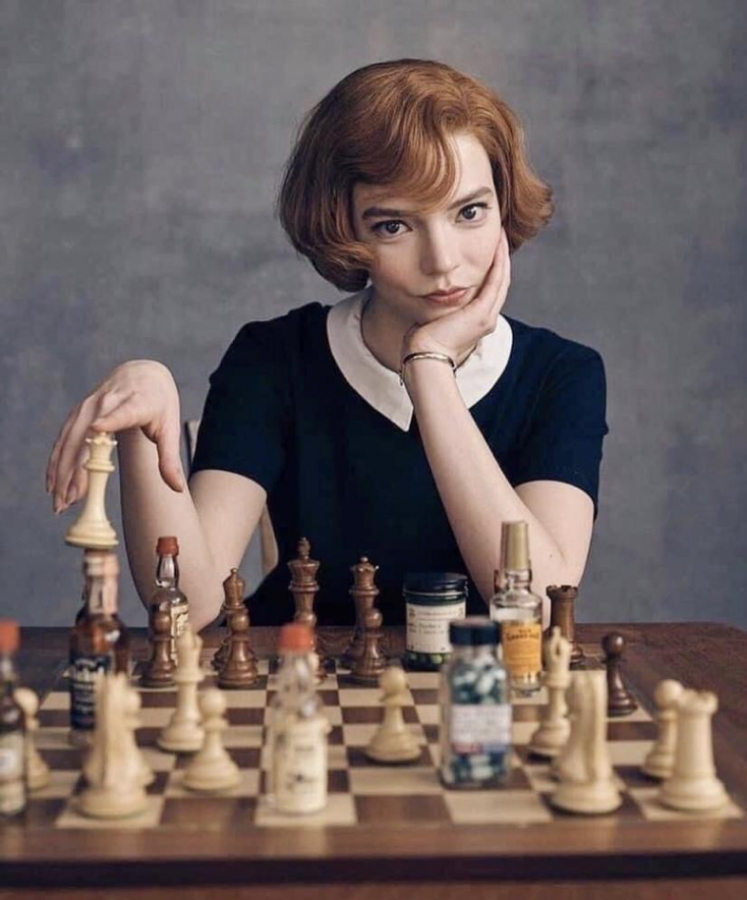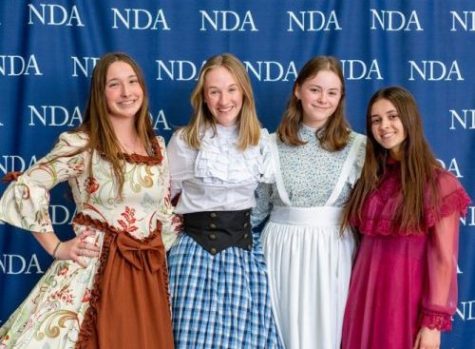Series Reviews with Sarah #1: Queen’s Gambit
Disclaimer: This is a show that I enjoyed and would recommend to anyone. You might get more out of this article if you have already seen the series. If you have not, be warned that there are plenty of spoilers in the words to come and it of course is written of my own opinions. For a general review, skip to the last paragraph.
Upon first reading the title of this new limited series on Netflix, and not knowing anything about chess, I thought that this show was about royals and some sort of risky beginning to the royal life or something along those lines. That impression was completely wrong because this show is about an orphan girl and her affinity for chess and competition in the 1960s.
The beginning was admittedly confusing which is not unusual for when starting a new show. I like that they jump right into the action, despite the audience not knowing exactly what that action means or who’s who. Then suddenly the girl’s picture is being taken, which at first thought maybe it does have some correlation to royals and I just don’t know it. And then everything that happened in the first three minutes is disregarded until the end. We jump back to her past in an explanation up to the events with which the series began. This tactic in a show is something I find very interesting, although we know very little in those first three minutes, it feels as though we may be in on a secret until the story catches up to that point, which I liked in this series. Elizabeth, Beth Harmon is left alone in the world and brought to a very strange orphanage, with a creepy headmistress, where the girls are forced to take what they call “magic vitamins.” This point, to me, was definitely the strangest making young girls take drugs that seem to be similar to a hallucinogen or just put them on some sort of high, which Beth takes advantage of. Her abuse of this tranquilizer incorporates the use of special effects into the series. Beth can imagine the board and the pieces on the ceiling in an obviously edited scene. I think it’s important to have a sneak peek into the main character’s thoughts which we can get from this and to have a variety of ways in which we learn about characters and, in this case specifically, her tendency toward addiction/ continual use of substances. She adventures into the basement and meets a man named Mr. Shaibel. He reluctantly teaches Beth chess, and that is where the story truly begins.
Mr. Shaibel is the first person to tell Beth “Girls don’t play chess.” I feel as though this show, while tackling drugs, and substance abuse, as well as relationships, sexuality, and coming of age, the director/s really challenge the gender roles that were present then. It shows girls now that they can still break through glass ceilings even if everyone tells them they can’t. Beth embodies the character who pushes the boundaries as we see with Mr. Shaibel, which is admirable because I would’ve expected her to be more timid around an older man especially in a fairly new environment, and during that time period. She was breaking the standards of men and women’s interactions and competition in a sport of sorts. She’s disappointed that her platform and all the press about her is in relation with her being a girl in a man dominated field, rather than her actual skills.
Beth initially relied on her tranquilizer pills to play chess. She developed an addiction because she took it everyday or skipped and took a few the next day. She remains very stoic in her games and it carries into her personal life which she mostly drowns out with drugs and alcohol. It seems that a state of intoxication is what she’s comfortable in which leaves me questioning if the substances are for coping or if chess is the coping mechanism?
I really like the incorporation of her sliver of a normal high school experience. She struggles with trying to be like everyone else, knowing more than the other students in her classes, crushes, mean girls, and of course puberty. I am sure that she felt embarrassment in her first experiences at school. I think that the writers chose to include this segment into the show to 1. redefine her age 2. once again stress the coming of age story that underlined the series and 3. to show her emergence into the world beyond Methuen.
She has this tendency to lean on her hands or place her hands on her neck or bite her fingers, which I find fascinating. I think that it is a sort of focus method
I don’t know about other people but I love when the audience discovers why a show is called what it is and I think that the way they introduce the queen’s gambit as an opening, in the opening of the show is fantastic. Beth also uses the Queen’s Gambit in her last game that we see. I will admit my knowledge of chess, although I still don’t really know how to play, has definitely expanded since watching this series. I appreciate that the series features a female star and a female in the chess world just really carries the show and this point is probably what drew me in most. I really like Anya Taylor-Joy who plays Beth, she shows her self-assuredness and presents herself and her emotions very well, for the most part.After Beth’s adoption, I found it shocking but also a really smart dramatic choice to have the father, Mr. Wheatley, leave and the mother, Alma, be slightly abrasive in the beginning of their relationship (made me somewhat dislike the mother at first but then I began to understand their dynamic) to show the growth throughout the series. It is obvious that Beth feels out of place, which again shows the growth as a character as she gets older and more established. I love being able to see how the character in a show or movie has changed since the beginning and the director certainly develops this between Beth and Alma.. Another point that I think was very well thought out on the part of the director is clock ticking as background music. It speeds up and gets louder in the most intense moments but still feels like it’s part of a chess match. I like the fashion in the series for most of it. I feel like it’s sophisticated or at least gives that impression and I also think that chess gives the same impression. I like at the end how we finally catch up to where we began and complete the story that we originally knew nothing about heartwarming ending
Overall, I think that Beth represents a talented yet rebellious teenager. She pushes the boundaries to explore herself and the world and in the process gets tangled up in drugs and alcohol. She certainly provides insight into the world of chess, the sexism of the past, and generally the culture of the 1960s into the 70s. We get a hint of how Americans felt amidst the Cold War. Although the central focus is of course the game of chess and the strategy that comes with it, Elizabeth Harmon represents and displays much more than that. Watch for yourself on Netflix. I highly recommend it. It may seem like a boring subject for a show, but it kept me on the edge of my seat for a total of about 8 hours.












